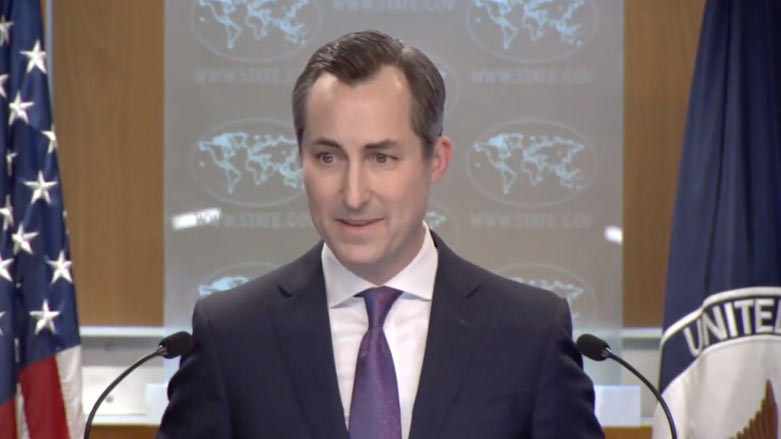U.S. Continues Opposition to Normalization of Syria Ties, but Maintains Working Relationship with Saudi Arabia

WASHINGTON DC, United States (Kurdistan 24) – The State Department’s new Spokesperson, Matthew Miller, repeated the Biden administration’s opposition to the normalization of ties with the Syrian regime, even after Syrian President Bashar al-Assad attended the Arab League summit in Saudi Arabia on Friday.
That event marked the end of the League’s 12-year suspension of Syria’s membership for the regime’s brutal repression of the Syrian population, which included the use of chemical weapons.
Asked on Monday for comment on the final statement of the Arab League summit, Miller responded, “I will say, as we have said before, we continue to oppose normalization with the Syrian regime.”
“We do not believe it was appropriate to readmit Syria into the Arab League, and we made that position clear to our partners in the region,” he continued.
But Miller went out of the way, like his predecessors, to make clear this was not an issue that disrupted the relationship between the U.S. and its Arab partners, above all Saudi Arabia, which hosted the summit and played a key role in returning Syria to the Arab League.
Illicit Drugs as Weapon of War
Referring to America’s Arab partners, who worked to return Syria to the Arab League, Miller stated, “If those countries are to continue to engage or to resume engagement with Syria, we think it’s important that they demand progress on a number of areas where we have concerns.” He then cited the “trafficking of Captagon” and “humanitarian issues in the region.”
“So while we oppose any normalization with the Assad regime, we do hope and expect that our partners in the region will press for progress on the many issues on which we have shared concerns,” Miller concluded.
The Qatari based news channel, Al-Jazeera, described Captagon as an “addictive, amphetamine-type stimulant mass-produced in Syria and smuggled to the Gulf states.”
Al-Jazeera even suggested that the Assad regime was using Captagon as a vehicle for pressuring those countries “in talks on reinstating Syria’s Arab League membership,” as they really do want to end the flood of Captagon coming out of Syria.
Indeed, it is not only the Gulf countries that have been targeted by Damascus in its Captagon trade. In mid-March, Iraq’s security forces seized some three million Captagon pills, being smuggled into the country from Syria at the al-Qaim border crossing.
Read More: Iraq seizes over 3 million Captagon pills
A week later, security forces in the Kurdish-controlled area of northeast Syria, seized another 15,000 Captagon pills, apparently intended for the Iraqi market.
Read More: Asayish captures 15,000 captagon pills in northeast Syria
Whether Syria’s return to the Arab League will cause it to reduce its export of the illicit drug remains to be seen. After all, when one party succumbs to such pressure, often enough, it leads to inviting more.
U.S.-Saudi Cooperation: Ukraine War, Sudan’s Military Conflict
Recent events have illustrated aspects of U.S.-Saudi cooperation, where the two countries work together to promote shared goals. That helps explain the muted quality of Washington’s criticism of the Saudi role in resuming Arab ties with Damascus.
One aspect of their coordination involves Russia’s war in Ukraine. While many third world countries have adopted a neutral position toward that conflict. Saudi Arabia has not.
Riyadh has pledged a significant amount of aid to Ukraine, nearly $400 million, and it has regularly voted in support of Ukraine at the United Nations.
Thus, Ukrainian President Volodymyr Zelensky was a surprise guest at the Jeddah summit, where he appealed for Arab support, even as he also accused some of those present of “turning a blind eye” to Russia’s aggression.
Washington and Riyadh have also coordinated in their effort to stop the bloodshed in Sudan, which has reached astonishing levels, as two rival military factions fight for control of the country.
The conflict began seven weeks ago. The infighting has killed nearly 900 civilians, while over one million people have been forced to flee their homes.
On Saturday, the U.S. and Saudi Arabia announced they had secured an agreement between the two warring parties on a seven-day ceasefire to allow for the delivery of humanitarian aid.
“Given the brutality of the conflict, our immediate focus has been on stopping the fighting to relieve the suffering of the Sudanese people,” U.S. Secretary of State Antony Blinken said in a written statement on Saturday, as he concluded, “The Kingdom of Saudi Arabia and the United States stand by” the Sudanese people, “and we demand the parties fully abide by their commitments” in order “to provide them with urgently needed relief.”
So far, the ceasefire has had a very rocky start, and it remains to be seen whether it will take effect and serve its intended purpose of allowing for the provision of humanitarian aid.
Whatever the outcome proves to be, however, it will not diminish the view in Washington and Riyadh that despite their differences, the two countries need to work together to advance important, common goals in the Middle East and elsewhere.
